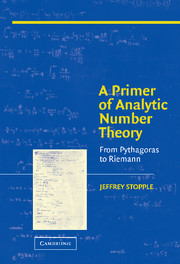Book contents
- Frontmatter
- Contents
- Preface
- Chapter 1 Sums and Differences
- Chapter 2 Products and Divisibility
- Chapter 3 Order of Magnitude
- Chapter 4 Averages
- Interlude 1 Calculus
- Chapter 5 Primes
- Interlude 2 Series
- Chapter 6 Basel Problem
- Chapter 7 Euler's Product
- Interlude 3 Complex Numbers
- Chapter 8 The Riemann Zeta Function
- Chapter 9 Symmetry
- Chapter 10 Explicit Formula
- Interlude 4 Modular Arithmetic
- Chapter 11 Pell's Equation
- Chapter 12 Elliptic Curves
- Chapter 13 Analytic Theory of Algebraic Numbers
- Solutions
- Bibliography
- Index
Chapter 8 - The Riemann Zeta Function
Published online by Cambridge University Press: 05 September 2012
- Frontmatter
- Contents
- Preface
- Chapter 1 Sums and Differences
- Chapter 2 Products and Divisibility
- Chapter 3 Order of Magnitude
- Chapter 4 Averages
- Interlude 1 Calculus
- Chapter 5 Primes
- Interlude 2 Series
- Chapter 6 Basel Problem
- Chapter 7 Euler's Product
- Interlude 3 Complex Numbers
- Chapter 8 The Riemann Zeta Function
- Chapter 9 Symmetry
- Chapter 10 Explicit Formula
- Interlude 4 Modular Arithmetic
- Chapter 11 Pell's Equation
- Chapter 12 Elliptic Curves
- Chapter 13 Analytic Theory of Algebraic Numbers
- Solutions
- Bibliography
- Index
Summary
Mathematicians have tried in vain to this day to discover some order in the sequence of prime numbers, and we have reason to believe that it is a mystery into which the mind will never penetrate.
Leonard EulerGiven the number of times we've mentioned Euler's work, you might think it is odd that the zeta function is named for Riemann. The next three chapters will try to counter that impression. In fact, what Riemann showed was that, despite Euler's quote above, there is a certain regularity to the sequence of prime numbers.
Georg Friedrich Bernhard Riemann (1826–1866). Riemann, just like Euler before him, began university studies as a student of theology, in accordance with his father's wishes, before switching to mathematics. Riemann had a very short career and produced only a few papers before he died of tuberculosis. In spite of that, he was one of the greatest mathematicians of all time.
For his Habilitationsvortrag, the advanced part of his Ph.D. degree, Riemann prepared three potential topics to lecture on. To his surprise, Gauss selected “On the Hypotheses that lie at the foundations of geometry.” The first part of the lecture describes the mathematical problem of defining n-dimensional space with an abstract concept of distance. In the second part, he discussed the question of the actual geometry of the universe we live in.
- Type
- Chapter
- Information
- A Primer of Analytic Number TheoryFrom Pythagoras to Riemann, pp. 193 - 215Publisher: Cambridge University PressPrint publication year: 2003



